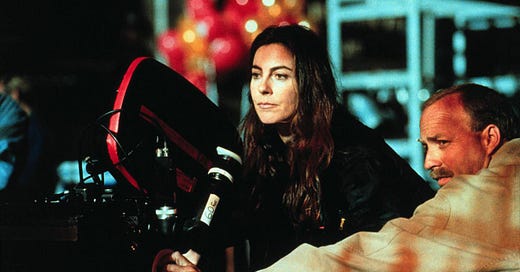(20th Century Studios / Lightstorm Entertainment)
When I was in film school, usually the same five names came up during discussions on female filmmakers: Dorothy Arzner, Ida Lupino, Jane Campion, Sofia Coppola and Kathryn Bigelow. Dorothy and Ida represented women behind the camera for the old Hollywood era, while Jane, Kathryn and Sofia for the modern period. Obviously, you can see the huge ratio imbalance if there’s allegedly less than ten important women placed in film history next to the hundred or so male filmmakers with similar legacies. This isn’t even including hit comedy directors like Penny Marshall, Nora Ephron and Amy Heckerling or acclaimed Euro filmmakers a la Agnes Varda and Chantal Akerman. Out of this group, Kathryn Bigelow is a little different than her peers, in that she’s sometimes considered ‘one of the boys,’ or not very girly with her art, especially compared to someone like Sofia or Jane. Kathryn got this rep for a couple of reasons. One is her early, huge box-office hit, Point Break (1991) starring Keanu Reeves as an undercover cop taking down Patrick Swayze’s leader of LA bank robbers. The other is Kathryn’s ex-husband and former collaborator, action film legend James Cameron.
Watching Point Break, I really doubt anyone would specifically guess a woman was in the director’s chair without the film credits. There’s flashy, over-the-top, slightly cheesy, exciting and very macho action tropes typical of the ‘90s. The only thing missing might be the lack of male gaze surrounding the women in the film, since the director is clearly a woman—though we get a few particularly beefcake-y topless shots of Keanu. Kathryn’s first action feature was the cop drama Blue Steel (1990) only a year earlier, following the indie thrillers The Loveless (1981) and Near Dark (1987). Jim Cameron fans have noticed some of the casts and crews from his action classics The Terminator (1984) and Aliens (1986) were recruited for Kathryn’s vampire flick, Near Dark. Naturally, this isn’t a coincidence considering the pair’s early relationship at the time. Ironically, while Kathryn was proving herself as a good action and suspense director during this period, Jim was the one getting credit for popularizing strong female leads with Sigourney Weaver’s Ellen Ripley in Aliens and Linda Hamilton’s Sarah Connor in Terminator. The two officially collaborated three years after divorcing on the futuristic crime thriller Strange Days (1995) with Ralph Fiennes and Angela Bassett; which surprisingly underperformed at the BO when the former couple were at the prime of their careers post-Point Break and Jim’s T2: Judgment Day (1991). But fortunately for all involved, Strange Days has grown to have a nice little cult following with film fans.
(20th Century Studios / Lightstorm Entertainment)
Looking at Kathryn’s Wiki and IMDb pages, it’s actually not surprising she hung on to the action genre and male leads for a while. Her first female centered picture since Blue Steel [starring Jamie Lee Curtis] was the retro mystery The Weight of Water (2000) featuring Elizabeth Hurley, Sean Penn and Sarah Polley, which flopped with both audiences and critics. It wouldn’t be until after Kathryn made history as the first woman to win Best Director at the Academy Awards for her Iraq War drama The Hurt Locker (2008)—where Jim was also heavily noted and jested in the press as her fellow nominee for his own 3D blockbuster Avatar (2009)—that Kathryn finally directed a female led movie again with Zero Dark Thirty (2012). Producer Megan Ellison originally lobbied hard for Rooney Mara to be cast in the post-9/11, Al-Qaeda piece, but Kathryn pushed for then rising star Jessica Chastain. A bit more age appropriate and mature than Rooney at the time, some still found Jessica’s portrayal of protagonist Maya a bit miscast, having so much femininity and poise for a hard and determined CIA analyst. But Kathryn, Jessica and screenwriter Mark Boal proved all the doubters wrong by crafting an interesting, fresh take on a female main character who isn’t around superheroes; and earned Jessica an Oscar nomination for Best Actress with Zero Dark Thirty.
Since 2012, Kathryn continues to be one of Hollywood’s most valuable and creative working filmmakers. She consistently chooses intriguing screen projects such as the 1960s political-historical drama Detroit (2017), the animated elephant PSA Last Days (2014), an episode of ABC’s sci-fi mini-series “Wild Palms” (1993), three episodes of NBC’s acclaimed crime series “Homicide: Life on the Street” (1998-99), and even a few music videos, including for New Order’s ‘Touched by the Hand of God’ (1987). Like her fellow film legends—man or woman—Kathryn has the eye, versatility and success to make it last.






I learned so much with this article.. Thank you!